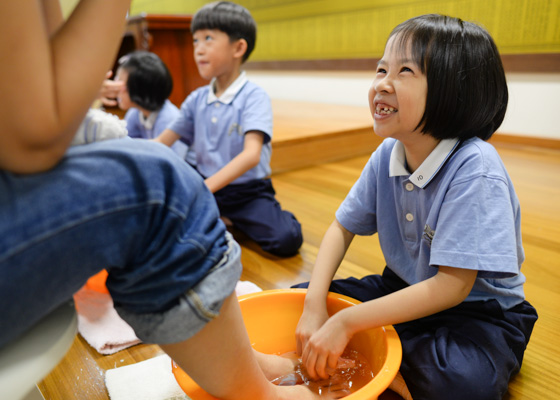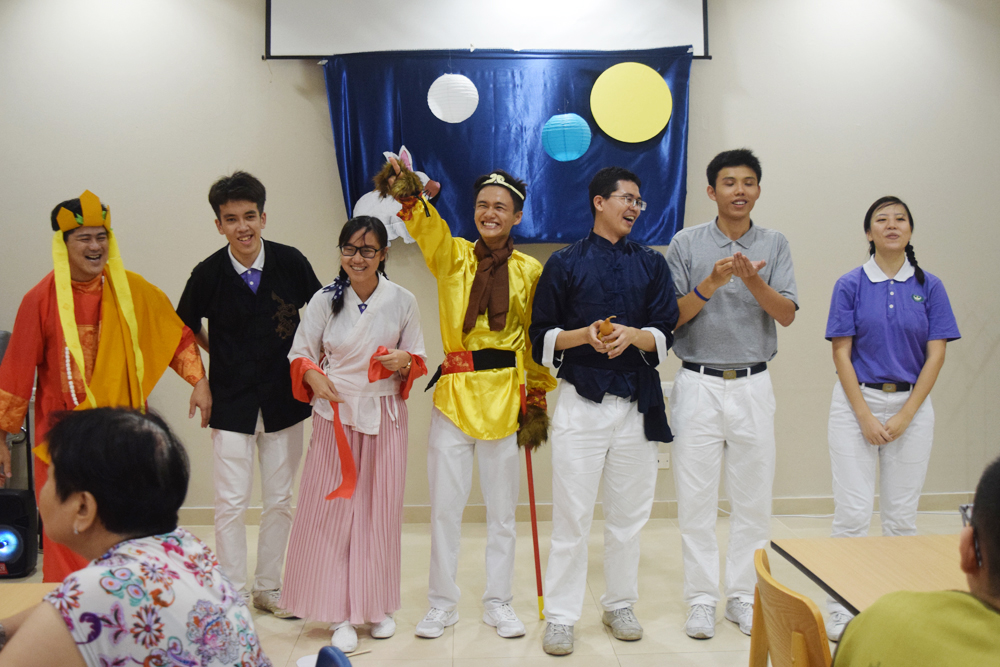
Photo by Ng Shey Ying
“Look at the rubbish over here! Look at the plastic bags in the ocean!”
It was a scorching Sunday, and a group of young children were busy picking up trash with their tongs along the beach of East Coast Park and sorting it accordingly for recycling.
These children were students from the Tzu Chi Parent-Child Bonding Class. On 23rd July 2017, the Class held an outing, and due to the huge turnout, the students were divided into two groups - one group went to the beach along East Coast Park, while the other group went to Kok Fah Technology Farm to learn gardening.
The theme of the day’s outing was “Serving the Public”, with the hopes of nurturing the seeds of kindness in the little hearts and instilling the ideal of “joy in doing good deeds” through public clean-up activities.

Photo by Ng Shey Ying
Singapore is an urban city-state with very limited agricultural land, and it imports 90% of its food. Young children have few opportunities to be in touch with nature; they possess little knowledge on agriculture, and are unaware of the hard work that farming entails.
The first group of children from the Parent-Child Bonding Class arrived at Kok Fah Technology Farm Pte Ltd, located within Choa Chu Kang. Kok Fah is a modern farm that employs vertical farming techniques, to grow a wide variety of vegetables, such as cai xin, amaranth, cabbage, mustard greens, sweet potato leaves, etc. The farm is open to the public on weekends and public holidays. Schools and other organisations can conduct learning tours to the farm on these days, too.
The children, together with their parents, were led by three staff members of the farm who served as guides, in explaining the science behind the different hydroponic systems used in the farm.

Photo by Ng Shey Ying
The farm also employs a tray system that resembles egg cartons. The holes in the trays are filled with peat moss and seeds before the trays are placed into the nursery. One of the farm guides, Wu Jun Ye, explained that such a high-tech process could reduce the cultivation time by ten days.

Photo by Ng Shey Ying
The little children demonstrated a strong curiosity in every aspect of vegetable cultivation, listening intently to every little detail, and even asking questions to satisfy their curiosities. As the entire farm was encased by protective netting to keep away pests, coupled with the steaming hot weather, there was not a dry shirt in sight as perspiration soaked everyone’s shirts and tops. The accompanying Tzu Chi volunteers frequently fanned the kids with pieces of paper or cardboard, to provide them some temporary respite from the sweltering heat, while their own faces were dripping with perspiration.
During the visit, the children were also exposed to DIY experiences. They were guided to do simple tasks, such as filling little pots with peat moss and vegetable seeds, and transplanting mini cactus plants into small flower pots. Everyone carefully worked on their DIY creations, which they happily brought home at the end of the day’s activity.

Photo by Ng Shey Ying

Photo by Ng Shey Ying
After the gardening activity, the children were divided into clean-up teams, to start cleaning up the classrooms, dining area, and greenhouse accordingly. Everyone worked together to sweep and mop the floor, wipe the tables and chairs, and to do other miscellaneous tasks like removing weeds from flower pots, etc. Many hands make light work-- under the unified efforts of the children, the appointed areas were spick and span in double-quick time.
After lunch, it was time for some fun with brain-teasers, which aimed to cultivate a team spirit in the children. Volunteers also built upon the children’s understanding of loving the earth through the Jing Si Aphorism, “With green hands and compassionate hearts, let us be united as gardeners of this great Earth”.

Photo by Ng Shey Ying

Photo by Goh Lam Kia
At the other end of Singapore, the second group of children from the Parent-Child Bonding Class arrived at the beach of East Coast Park. The Park is a popular spot for social gatherings and is often bustling with fun-filled activities. However, in the midst of enjoyment, a lot of trash is often generated and little do people think of disposing it properly.
Under the scorching sun, each child was armed with a pair of tongs to pick up trash, and recyclable items were further sorted into their material types.
“Look at the trash over here!”
“Look at the plastic bags in the ocean!”
Some of the children exclaimed with shock while cleaning the beach.

Photo by Teo Moh Sang
“There is trash over here!” Mdm Xie Shu Ping accompanied her son, Mo Jing Yang, throughout the activity, to give him guidance. The young boy regarded the trash-picking activity as a treasure hunting game, and got really excited each time he spotted some trash.
“This is Styrofoam, which is non-biodegradable trash.”
Learning about the harmful environmental effects of Styrofoam packaging from his school textbook, Jing Yang worked very hard to pick up every bit of harmful garbage from the beach, and even dug into the sand to recover half-buried Styrofoam packaging. He was soaked with perspiration from all the physical exertion under the hot sun on the beach, but said with a measure of personal satisfaction: “I am very happy, because the beach has become clean.” Mdm Xie Shu Ping also expressed with some measure of shock: “In reality, our beaches are not as clean as I had imagined.”

Photo by Teo Moh Sang

Photo by Teo Moh Sang
This outing activity not only fostered closer ties between parents and their children, but also enabled the children to gain some insights into their daily life. Xiao Shao Yu shared at the end of the activity: “We generate a lot of rubbish and buy things packaged with Styrofoam. We should only buy what we need, and be conscious not to waste food.”



